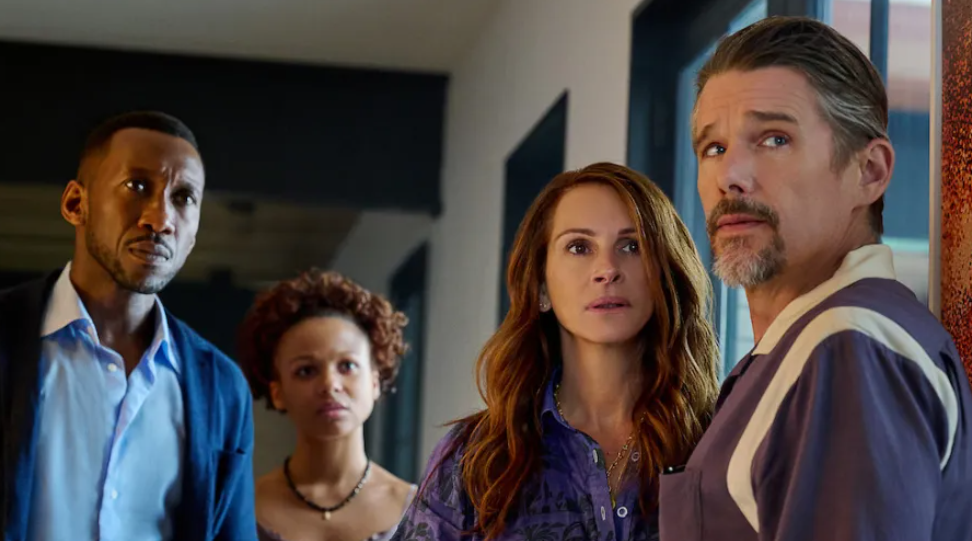As I settled in for a cozy movie night, eager to dive into the latest Netflix sensation, “Leave the World Behind,” I found myself quickly going from at ease to anxious about 15 minutes into the film. This build up of tension is done brilliantly by Director Sam Esmail, creator of Mr. Robot, and features a stellar cast including Julia Roberts, Mahershala Ali, Ethan Hawke, Myha’la, and Kevin Bacon. The psychological thriller, based on Rumaan Alam’s novel, took me on a gripping journey through a world unraveling at the seams, with technology at the heart of the breakdown.
The plot revolves around Amanda Sanford and her family’s spontaneous escape to an Airbnb, only to witness the gradual collapse of our most essential technologies—phones, internet, and more. The film unfolds rapidly, revealing an apocalyptic threat, by way of crashed airplanes, unusual animal migration and gasp, Amanda’s daughter Rose unable to stream the finale of “Friends” on her iPad. However, through all this, the cause is a mystery to both viewers and the main characters.
As the characters try to piece together the events, there’s a stark scene between Mahershala Ali’s character, GH, and Julia Roberts’ character, Amanda. GH reveals his career in finance, explaining how the market can sometimes foretell catastrophic events if you know what to look for. He ominously suggests that there was likely an attack on our satellites, rendering navigation among other critical technologies out of commission. This is where my hair stood on end.

As someone working in the resilient PNT (positioning, navigation, timing) space at NextNav, this scene struck a nerve. It vividly portrayed the real-world concerns we often discuss within our industry. We know that GPS satellites control not just the positioning and navigation on our phones that we’re all familiar with, but the timing that GPS satellites provide allow us to use our ATM cards, credit cards, control stock markets, even the electrical grid. And GPS satellites are vulnerable to natural phenomena (like solar weather) as well as jamming and spoofing attacks by rogue actors and our nation’s adversaries. The idea that an attack on satellites could cripple our navigation systems, financial systems, and more, leading to widespread chaos is precisely the kind of scenario we at NextNav strive to safeguard against.
Leaders in the PNT industry understand the implications of such disruptions, emphasizing the need for resilient layers to GPS. It’s not just a nice-to-have; it’s crucial in safeguarding our nation’s critical infrastructure. Much like we insure our cars, our loved ones, our pets, and our homes, we may be overlooking one of our most vulnerable assets—the backbone of technological infrastructure. This is why the US government and the EU, among others, have done extensive testing on GPS alternatives. It’s also why leaders, like Gen. Chance Saltzman, Chief of Space Operations for the Space Force, stated earlier this year that, “Only the U.S. Space Force can provide these truly world-wide capabilities our forces absolutely require as they defend U.S. and allied interests around the world. In short, the joint force needs global communications, indications and warning, and precision,” he said.

And while I understand this story is fictionalized, I can’t help but remember this unnerving tale is executive produced by none other than former President Barack Obama and First Lady Michelle Obama. The reality that a former leader of our nation, who has insights into the scary repercussions and possibility of a full cyber-attack on our GPS satellites, adds an extra layer of contemplation for me as viewer.
Even for those not thinking about PNT regularly, the chaotic whirlwind depicted in “Leave the World Behind,” and Rose’s simple desire for closure on Rachel and Ross’s saga resonates. It’s a reminder that amidst the chaos, seeking comfort in things like our favorite shows is natural, but let’s not forget the importance of being proactive to protect the very things that are foundational to our livelihood. Because in the end, safeguarding our comforts requires more than just sitting back and watching – it demands an active role in preserving our connected world.